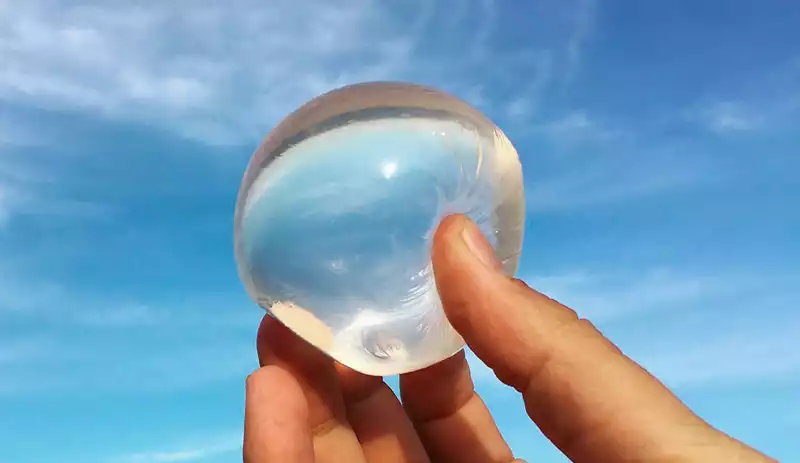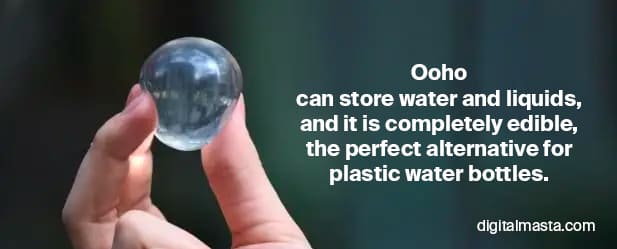You can also be interested in these:
- CES 2022: The year’s most anticipated tech event
- Graphene Aerogel: the lightest material on earth
- IBM optical circuits: Next-gen computers powered by light
- Seemingly all Intel Alder Lake CPU can be overclocked after all
Plastic bottles are not as easy to recycle as they seem. Consumers are instructed to simply dispose of plastic bottles into recycling bins and it will be as if they never existed. Unfortunately, this could not be any further from the truth. It takes a whole lot of energy to recycle water bottles, even more energy than it takes to make the bottles in the first place! This is why a London-based startup called Skipping Rocks Lab is taking this massive environmental problem into their own hands, or their own capsules!

An eco-friendly alternative to plastic
Skipping Rock Labs has created an edible water pouch called “Ooho” to help minimize the use of one-time plastics. Ooho looks like a futuristic water-filled orb protected by a thin jelly exterior. The spherical membrane that holds the water is mostly made out of seaweed. The round little water pod also allows people to eat their water if they choose to. The company first introduced themselves to the public in 2014 after testing their designs and being completely funded by only donations and grants.
The origin of the initiative
The seaweed water pouch was designed by a trio of art and design students who met in London during college. After working on a project that led them to collect and repurpose old plastic bottles, they decided to develop a more eco-conscious solution. The goal was to create an ultramodern packaging of water that could be easily accessible. The kicker was that it needed to disappear naturally rather than end up in a landfill. Nature was the remedy.

The team settled on creating a transparent gel wall that could act as the pouch’s membrane. It needed to hold a decent amount of water, but most importantly, it had to be biodegradable. Membranes are a very apparent solution in many aspects of nature, from fruits to eggs to single-cell organisms. The natural structure is meant to protect whatever is inside of it, without compressing what is being carried. The team needed a biodegradable fix to combat the rising percentage of single-use plastics, and so the water pouch’s membrane was born out of seaweed.
Physical properties of the seaweed water pouch
Ooho’s thin exterior is mostly made of seaweed. It uses a double membrane to contain its liquid with two key ingredients: sodium alginate from seaweed and calcium chloride. Sodium alginate is the salt form of alginic acid and gum mainly extracted from one of nature’s most renewable resources, brown seaweed. With so many different classes of brown algae existing, it is one of the most fast-growing sources of biodegradable materials. It grows at about one meter per day, which is nearly 40 inches per plant every single day. It’s not a competitive resource in comparison to food crops, nor does it actively need tending to. Brown seaweed doesn’t need fresh water, fertilizer, or massive farming tactics to produce more of it. On its own, it even neutralizes the acidity in the oceans. The start-up removes all taste, odor, and color from the seaweed after it is harvested to produce the exterior of its water pouch sphere.
The design of this edible sphere can also be seen in one of the most unique cooking techniques, spherification. It’s a culinary practice that employs a combination of ingredients to result in a liquid, squishy sphere. The common factor between Ooho’s seaweed water pouch and spherification techniques is that it leads to creating something edible. Rather than drink water, people can eat it and be even more hydrated through the membrane, too. People can pop the pod into their mouths or they can bite into it, drink the water, and throw it away. Ooho biodegrades in 4 to 6 weeks should one choose to toss it after drinking. The flavor is tasteless, but it may take a few tries to adjust to the texture of its exterior.
The seaweed water pouch put into the test
In 2019, the London Marathon organizers planned to replace 200,000 plastic bottles with Ooho containing a sports drink in its clever seaweed orb. According to Forbes, in 2018 alone, the London Marathon used over 919,000 plastic bottles. 2019’s goal was to lessen the use of plastic bottles, but nearly 700,000 plastic bottles were still used.

The seaweed pods have also been used at music festivals, providing sports drinks and alcoholic beverages. The seaweed water pouch can definitely carry other liquids, including soft drinks, coloring, and cosmetics. It also costs way less to make than plastic. Each pouch of water takes only 2 cents to produce. Perhaps the start-up will eventually choose to add flavoring or colors to the seaweed water pouch exterior! The company does plan to expand its product selections with new items such as sauce packets and takeaway containers.
A potential solution to the environmental problem
Plastic bottles are becoming more harmful to the oceans and their surrounding environments by the moment. Studies show that throughout the entire world, people purchase a total of 1 million plastic bottles per minute. Unfortunately, the majority of them do not get recycled. They wreak havoc on the environment by making our oceans their final settling grounds. A majority of them also end up in landfills or incarcerated with other trash. This seaweed water pouch can aid in delivering humanity a cleaner, safer world. Even the manufacturing cost factor of seaweed is more affordable.
The seaweed water pouch invention has the potential to reverse some of the damage that has already plagued our oceans. With so many pounds of plastic ending up on our beaches and within the waters, plastic pollution is impacting humans daily. To avoid having marine life being flooded with microplastics, innovations like Ooho can provide a very viable solution.
Ooho carries a deep mission that its audience actively supports. The company was able to go into production after earning over $1 million on their crowdfunding campaigns for their water pouches. They have also received investments from Sky Ocean Ventures, a campaign that focuses on helping people become aware of plastic pollution. Skipping Rocks Lab is currently a part of Climate KIC, Europe’s largest public-private partnership focused on climate innovation. At this time, Ooho is not sold in stores. It can be found at select events or purchased on their website.
More stories like this
- CES 2022: The year’s most anticipated tech event
- Graphene Aerogel: the lightest material on earth
- IBM optical circuits: Next-gen computers powered by light
- Seemingly all Intel Alder Lake CPU can be overclocked after all
- These power shoes generate electricity with every step
- What is Identity-Based IBAC Access Control?